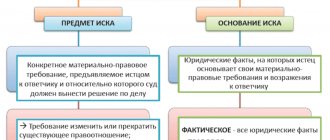Nowadays, many married couples get divorced, while some ex-spouses continue to live together.
Sometimes the situation has already reached a critical point - the ex-wife refuses to leave the apartment, citing the fact that she has nowhere to go.
What to do in such a situation, how to write your ex-wife out of the apartment after a divorce without her consent in 2021?
According to Art. 40 of the Constitution of the Russian Federation, every citizen has the right to housing. Without the consent of the resident, it is impossible to deprive him of a roof over his head.
However, when it comes to ex-spouses living in the same apartment, divorce is the basis for deregistering one of the spouses. This is stated in paragraph 4 of Art. 31 of the Housing Code of the Russian Federation.
The basis for eviction of the ex-wife will be the termination of family relations, confirmation of which will be the presentation of a certificate of divorce.
Grounds for deregistration of an ex-wife
The main reason for expelling an ex-wife from her ex-husband’s apartment will be divorce. But there are other grounds for deregistering a wife:
- Only the divorced spouse took part in the privatization of housing. Since the man in this case is the sole owner of the property, he has the right to remove the tenants from it without their consent. This rule is spelled out in Art. 30 Housing Code of the Russian Federation;
- the ex-wife is registered at the husband’s residence address, but in fact lives in another place, and she does not pay utilities in the apartment where she is registered. On this basis, the ex-spouse has the right to discharge the ex-spouse without her consent, but only in court;
- if the marriage contract states that upon divorce, the apartment completely goes to the husband, while the wife will not have any rights to it.
About settlement by agreement in case of divorce
After former relatives separate, the property owner has a great desire to evict the former spouse.
According to the housing code, you can discharge your “ex-other half” by concluding an oral peace agreement.
This method is acceptable for those married couples who were able to maintain friendly relations after a divorce. For such ex-spouses, it is enough to simply talk among themselves, give reasons why one of them needs to be discharged at the place of previous residence.
Refusal to remove wife from registration after divorce
Divorce may not always result in the forced eviction of an ex-wife. There are situations in which it will not be possible to discharge an ex-spouse:
- if she has a share in the apartment;
- if she participated in the privatization of housing;
- if the apartment was purchased by the spouses during marriage;
- if the spouse renounced her share in the apartment during the privatization process in favor of her spouse or child. In this case, the woman retains a guarantee of lifelong residence, while the divorce of the husband and wife will not be the basis for the woman’s discharge in this case;
- if the right to live in an apartment remains with the woman even after a divorce, and such a condition is specified in the marriage contract;
- if the ex-wife has problems finding an apartment to live in, she simply has nowhere to live;
- if the former live in municipal housing under a social rental agreement.
Let's sum it up
After a divorce, the homeowner has the right to expel his former spouse from his apartment. If a woman refuses to leave her and be discharged on a voluntary basis, then the man has the right to initiate legal proceedings, which can last up to 3 months.
The legislation establishes a list of grounds on which the ex-wife’s discharge will be either postponed or completely terminated. For example, if a woman has no other property, the court will allocate her a certain time during which she will remain in her ex-husband’s apartment. If the spouses purchased an apartment with a mortgage or the woman invested financially in renovation work, then the property will be recognized as common marital property.
A separate issue concerns children. The child has the right to a mandatory share in the father’s apartment, and if the court leaves the minor with his wife, the man will not be able to legally discharge the woman.
Extracting an ex-wife from an apartment without her consent: procedure
If the ex-wife does not want to leave the apartment (provided that she is not the owner, that is, the housing belongs to her husband), then she can only be forcibly evicted through a judicial procedure.
To remove a woman from registration without her knowledge, it is necessary to go through a number of successive steps:
- Pre-trial settlement of the situation. Before going to court with a claim for forced eviction of a tenant, it is necessary to negotiate with your ex-wife. To confirm that the conflict situation has been resolved peacefully, it is advisable that the ex-husband notify his wife about the deregistration by sending her a written notice of voluntary deregistration.
- Going to court. If, after an attempt to peacefully resolve the conflict, the ex-spouse refuses to move out of the apartment, then the spouse must go to court at the location of the property, draw up a statement of claim, attaching the necessary documents to it: a certificate of divorce, grounds for deregistration (payment receipts) housing and communal services exclusively by the ex-husband), a receipt for payment of state duty, an extract from the Unified State Register of Real Estate, title documents for housing.
- Go through all stages of the trial. The plaintiff must participate in the main hearings and provide the judge with any information related to the claim. The result of the court hearing will be the issuance of a writ of execution to implement the decision.
- The writ of execution is handed over to the bailiff, who will be able to issue the ex-spouse without her consent by court decision.
Help from a housing lawyer:
Details
Disputes with the Management Company
Legal advice Defense in court
Assistance from experienced housing lawyers in disputes with the Management Company, HOA or housing cooperative - legal advice and protection of your rights in court.
Housing lawyer
Disputes with the management company, courts for the right of residence, ownership, disposal of housing, disputes with the administration
Bay apartments
Disputes regarding flooding of an apartment and compensation for damage.
Housing disputes
Housing disputes of any complexity. Experienced Lawyers and Advocates
Deadlines for forced deregistration
If the wife does not want to leave her ex-husband’s apartment, then the matter may drag on for several months:
- 5 days - this period is provided for consideration of the claim;
- it takes from 1 to 2 months to conduct preliminary and main hearings;
- 30 days - the judge allocates this period to the other party to the conflict to appeal the verdict;
- 1-6 months - the judge can give such a deferment for eviction if the woman has nowhere to live, she needs to find an apartment.
When the procedure is not possible
If the apartment in which the family lived before the divorce was purchased jointly during the marriage, then regardless of whose name the documents for housing are issued, it is recognized as common. That is, both spouses are the owners of such real estate. Consequently, in this case, the husband cannot forcibly expel his ex-wife from the apartment, because even after the divorce she has the right to freely use her own property.
The only way out here (provided that the spouses were unable to reach an amicable agreement) is to divide the property acquired jointly during the marriage, including real estate, through the court.
In addition, one of the spouses will not be able to deprive the other of registration in cases where:
- Although the apartment was purchased by the husband (wife) before marriage, during the period of family life, at the expense of the second spouse, repairs, reconstruction or other work (inseparable improvements) were carried out, thanks to which the value of such real estate increased significantly. In this case, the court may recognize this housing as joint, and, therefore, the second spouse will also become the owner and will have the right to have registration at this place of residence. Without obtaining consent, no one will be able to prescribe it;
- A house, room or apartment was purchased during the marriage, but with money from the sale of another home owned by one of the spouses before the wedding. Unfortunately, quite often people do not care about the careful execution of such transactions. Most often, they believe that having sold premarital property and bought a new home with this money during the marriage, the owner will remain the sole owner of such real estate. However, the established practice in this category of court cases shows that without the appropriate documents (or a concluded marriage contract), it is very difficult, almost impossible, to prove the fact that the money received from the sale of someone’s premarital home was used to purchase a new apartment during marriage. Therefore, most often the courts recognize such real estate as jointly acquired property during marriage, purchased with common money. This leads to the fact that spouses are recognized as equal owners of real estate. Consequently, both have the right to register in this housing even after a divorce.
USEFUL INFORMATION: Is it possible to withdraw a divorce application from the court?
Peculiarities
It is not always possible for a husband to expel his ex-wife from an apartment after receiving a divorce certificate. Let's look at examples.
The ex-wife is the owner of the apartment or has a share in the housing
In such a situation, circumstances change dramatically . So, if the housing belongs only to the spouse, then it is impossible to discharge her from the apartment that belongs to her. She can remove her husband’s registration, but not the other way around.
Deregistration from public housing
To force an ex-wife out of a municipal apartment, it is necessary that the man has grounds for this.
If, for example, he can prove that she actually lives at a different address and does not help pay utility bills or make repairs, then the claim may be satisfied in court.
But such an outcome is only possible if the couple has no children . If there are children, then the situation usually becomes more complicated.
Deregistration with a child
What if there are children? Will the husband be able to register the child after a divorce with his ex-wife without her consent? The situation is complicated by the fact that the family has minor children (child).
To register relatives, it is necessary that the ex-wife has a place where she can register . If she owns housing, then no problems will arise, but if there is no living space, then the woman will have to find an apartment to rent.
But if a woman doesn’t want to move anywhere, then she won’t look for anything. Therefore, in this case, the court will again help resolve the issue.
Even if the husband has every reason to discharge his ex-wife (for example, she leads an immoral lifestyle, does not pay part of the utility bills, etc.), then it will not be possible to discharge the child “to nowhere.”
The judge may order the child to remain in the apartment with the father until the mother registers somewhere.
To deregister a mother and child, the father needs to consider the following points:
- obtain permission from the guardianship authorities to discharge the child - if the minor has a share in the apartment;
- the child must be provided with living conditions no worse than they were in the previous apartment;
- if the father wants to deregister his ex-wife and child due to the sale of housing, then when making a transaction, if he does not want to purchase new housing, he will have to open an account in the name of the child, and then deposit there an amount equal to the value of his share in the sold apartment.
Eviction from official living space
An apartment received by a spouse from an employer is issued to both spouses, but only for the period of performance of work duties and work. In order to expel an ex-spouse from a service apartment, you must have grounds for this, since according to the law, spouses can equally use it.
However, divorce is not a valid reason for forcibly deregistering a woman . To remove a woman from registration, more compelling reasons are needed, for example, after a divorce, the woman stopped paying utility bills or fulfilling the terms of the contract with the employer.
However, if during the court hearing it turns out that in the event of a forced eviction, the woman will have nowhere to register, then the judge may give her a reprieve until she finds housing.
Extract from a private home
The procedure for deregistering an ex-wife from a private house is no different from the procedure for deregistering from an apartment . It is possible to evict and deregister an ex-spouse without her consent only through a judicial procedure.
The plaintiff must write a statement asking to remove the person from the registration register, as well as evict him from the apartment.
Possible difficulties
List of potential problems and difficulties relevant to such a situation:
- Active opposition . The defendant often goes to court with counterclaims. At one meeting, it is necessary to consider not only the fact of eviction of a person, but also various financial issues and other claims. This greatly slows down the process.
- The apartment was purchased with a mortgage and is pledged . In such a situation, the bank will actively intervene in the procedure for dividing property and subsequent deregistration of the ex-wife. It is important for him that the collateral remains in a stable condition, that it is monitored and, most importantly, that at least one of the spouses continues to pay for the use of borrowed funds. If the current owner of the apartment confirms his obligations, then there will be no other claims from the bank.
- There is no other housing . The most difficult option is when the ex-wife has no other place of residence. Under such conditions, it will not be possible to evict a person; the court will be against simply throwing a person out onto the street.
Answers on questions
Is it possible to discharge the mother and leave the child?
In order to deregister only the ex-wife and leave the child, the woman must give her consent to such an action.
If she registers at a different address and wants to take the child with her, then in fact she will be able to do this by going to court.
The fact is that mothers are given preference in raising children, but if the ex-husband can collect evidence confirming that the child is better off with him, then the judge can leave the child in the father’s apartment.
The judge’s decision on who the child will stay with is influenced by several factors: the financial security of the parents, the presence of any diseases, the legal capacity of the father/mother, the responsibility of each parent for raising the child, the parents’ work schedule, the personal opinion of the minor, etc.
Is it possible to force eviction if the wife does not have an apartment?
If the wife does not have housing, and it does not matter whether it is her property or a rented apartment, but until the spouse finds a place to live and register, then the court will not allow her to be forcibly evicted anywhere.
The woman will be able to temporarily use the ex-husband’s housing until she finds another living space.
Is it possible to forcibly deregister an ex-spouse if I am the owner of an apartment?
If the apartment does not belong to the wife, she did not participate in privatization, does not have her own share, but is only registered in the apartment, then it is not so difficult to write her out. It is enough to file a claim with the court for forced discharge.
If the judge determines that the woman has a place to live and has relatives who can register her, then the judge will grant the claim. If a woman is lonely and has nowhere to go, then the court can meet her halfway - give her some time to find housing.
What to do if your ex does not leave the apartment even after a court decision?
If the ex-wife is categorically against the expulsion from her ex-husband’s apartment, even after the court’s decision she has not changed her point of view, then the apartment owner needs to contact the bailiffs so that they can resolve the issue.
There are situations when, after a breakup and division of property, the ex-wife refuses to leave the apartment where she previously lived with her husband. Is it possible to discharge an ex-wife from an apartment without her consent in 2021? This issue can only be resolved in court.
Yes, it is possible if she is not the owner, a shareholder, she does not have children, and there is other housing to live in . In this case, it will be possible to evict her, but this is an ideal option for a man.
Most often, the ex-husband is faced with the problem of deregistering his wife because she participated in privatization, she has a share in the apartment, or simply because she has nowhere to register.
Video: Evicting your ex-spouse
Basic information
After the spouses divorce, the former family members officially become strangers to each other. Divorce leads to many legal consequences, one of which is deprivation of the right to use the spouse's real estate.
If the owner of the residential premises is a man who registered a woman there, then she will need to be deregistered due to a divorce from the owner of the apartment.
Discharge can occur on a voluntary basis or compulsorily through the court. If a woman refuses to deregister herself, this will serve as evidence of the fact that the man tried to peacefully resolve the situation - and the court will take this factor into account.
Practice shows that in the vast majority of cases, women do not have a “backup option” for various reasons (renovations in a new apartment, lack of financial opportunities to rent housing). As a result, a woman is not able to leave the apartment immediately after a divorce - in this case, the man has the right to sue her.
If the eviction of a woman is required on legal grounds, but she does not yet have the opportunity to provide herself with at least temporary housing, then the court will give her a certain period of time to solve this problem. During this period, the ex-wife retains the right to reside in the man’s apartment.
Arbitrage practice
The main reason for the forced discharge of former spouses through the court is divorce with automatic termination of kinship. In addition, when making a decision, judges pay attention to many additional factors, such as:
- financial security of the defendant;
- whether the woman owns another home;
- common minor children.
Example. After the Solovyov family divorced, the husband continued to occupy municipal housing, and the wife, without leaving contact information, left the apartment. After some time, the man had a new woman, and the happy couple decided to get married, but first they wanted to finally break off all old ties and write Solovyova out of the apartment.
Soloviev immediately filed an application with the district court. The claim was accompanied by a divorce certificate, copies of rent receipts, the payment of which Solovyova had not participated in for more than two years, and a social tenancy agreement.
After reading the text of the claim, the defendant expressed disagreement with some of its points. According to the woman, she was forced to temporarily move from the disputed housing due to the socially dangerous behavior of her ex-husband, who tried in every possible way to ruin her life. In addition, the defendant convinced the court that she was ready to repay the rent arrears in full as soon as possible. To prove her words, Solovyova brought several neighbors who confirmed the plaintiff’s antisocial behavior.
After listening to the arguments of the parties, the judge decided to refuse to satisfy the demands of Solovyov’s claim and preserve Solovyova’s right to live in the disputed apartment in full.
From a mortgaged apartment
Eviction from a mortgaged apartment is carried out in two ways - through the court or on the own initiative of a former family member.
If a marriage contract was drawn up before the wedding, then the spouses after the divorce must follow the instructions of this document. If the agreement has not been signed, and the husband or wife does not agree to move out voluntarily, then the issue can be resolved through the court.
Reasons for evicting a spouse from a mortgaged apartment:
- Failure to pay mortgages and utilities.
- Damage to property.
- Hooliganism, disturbing the peace of other family members.
When making a decision, the court will take into account who the mortgage agreement was drawn up for and what share each of the couple is entitled to. If a husband or wife refused to pay their part of the loan, then there are no obstacles to their eviction from their home. But if the spouse regularly pays the loan, then the court cannot evict him, since he has the full right to use the apartment.
When making a decision, the court will take into account who the mortgage agreement was drawn up for and what share each of the couple is entitled to. If a husband or wife refused to pay their part of the loan, then there are no obstacles to their eviction from their home. But if the spouse regularly pays the loan, then the court cannot evict him, since he has the full right to use the apartment .
The initiator of the divorce during the consideration of the case must raise the issue of division of property and mortgage payments.
Denis Lvovich
Family lawyer. Work experience more than 10 years
Ask a Question
If you can’t come to an agreement, you can try to exchange the apartment for 2 cheaper and smaller living spaces.
In any case, the court decides what share each party is entitled to and how much they must pay on the loan. The initiator of the divorce must include all these nuances in the claim. If you verbally agree with your spouse on the division of property, it will be impossible to prove this in court.
The plaintiff can retain ownership of the mortgaged home only if he proves that the former partner did not participate in the repayment of the loan.
Filing a claim
It is necessary to file a claim taking into account the norms of the Code of Civil Procedure of the Russian Federation - Art. 131-132. The plaintiff’s efforts should be aimed at proving that the ex-wife does not have the right to use the apartment. This can be done with the help of written documents and witness testimony confirming that the former spouses do not live together and do not run a common household.
A positive outcome of the case is practically guaranteed if the apartment was purchased by the husband before marriage or when he received the property as sole property by inheritance. An extract is possible if there is a marriage contract, which clearly states the conditions that the ex-wife does not claim the apartment purchased during marriage (including with the spouse’s funds, including cases of mortgage lending). At the same time, you need to be prepared for the fact that the ex-wife may file a counterclaim in which she will demand that the marriage contract be declared invalid due to a violation of her property rights.
Loss of the right to use the apartment is confirmed by the fact that the spouse is absent from the living space, the payment of utilities has ceased, or the place of residence has changed. If she is absent from the apartment for a long time, the ex-wife does not pay for utilities, therefore, she has no interest or need to live in the living space.
Expert commentary
Kireev Maxim
Lawyer
In a divorce, the ex-wife ceases to be a member of the man's family. It can also be issued forcibly, since according to the Housing Code of the Russian Federation - Art. The 31st spouse is considered a family member of the home owner and loses the right to use real estate, except in a situation where the woman demands the right to temporary use of housing in court. Then the court may oblige the man to retain such a right for his ex-wife for a specified period.
The court may also oblige the ex-husband to provide housing for his wife and child, to whom he pays alimony. This happens in exceptional cases. Even at the stage of determining the child’s place of residence, the court usually leaves the minor with someone who, first of all, has the necessary conditions for the upbringing and development of the minor. Many women, wishing to retain the right to live with a child and receive alimony from their ex-husband for a minor (and for themselves), rent housing on their own or register with relatives.
Contents of the claim
The claim must be filed in the district court where the defendant lives. In the document the applicant states:
- name of the court;
- information about the plaintiff;
- information about the defendant;
- data about third parties - for example, about the legal representative of a common child if he is under the guardianship of third parties.
The statement of claim must be titled. It should indicate the circumstances of the marriage and the birth of common children (if any). You also need to indicate the date of divorce. The situation on the basis of which the ex-wife does not have the right to use the apartment should be consistently presented. For example, if the living space remained in the ownership of the husband and was purchased before marriage, or was transferred to the husband under a gratuitous transaction during marriage, then the man has the right to decide who and when to move into the apartment (with the exception of minor children, who can be registered with the father by decision court, regardless of consent).
Failure to pay part of the utilities, failure to fulfill obligations to maintain the apartment and common household property will also be in favor of the plaintiff. If ownership of an apartment was forcibly terminated when the court left the housing to the husband and the wife received proportionate compensation, then deregistration is possible on the basis of loss of the right to use. It will not be possible to expel an ex-wife from a privatized apartment if she was a party to the privatization transaction or received the right to permanent (indefinite) residence in the apartment.
The main task of the plaintiff is to consistently indicate, with reference to the norms of the Housing Code of the Russian Federation and other regulations, that the spouse does not have the right to use other housing. The presence of another apartment by the ex-wife (in which she lives or rents) will be in favor of the plaintiff.
Expert commentary
Gorbunova Olga
Lawyer
You should enlist the support of witnesses in advance, whose testimony is considered evidence (Part 1 of Article 55 of the Code of Civil Procedure of the Russian Federation). These may include neighbors and other residents of the apartment (procedural opponents may insist on the interest of such witnesses in resolving the case in favor of the plaintiff and insist on the bias of their testimony). Specialists from the HOA or management company or housing cooperative can act as witnesses.
It is advisable to draw up an act on the absence of the spouse (or on her non-residence) in the apartment, which is signed by specialists of the management organization and neighbors. The plaintiff must be prepared for the fact that the ex-wife can explain her long absence from the apartment by the fact that the ex-husband himself did not let her in (changed the locks, etc.). In such a situation, one should also refer to the testimony of witnesses.
Video recordings are used as evidence (for example, from entrance cameras, etc.). In any case, the spouse’s legal ownership of the apartment gives him the opportunity to seek the discharge of a former family member.
It will be more difficult in the case where the apartment is used under a social tenancy agreement. Then the owner of the property, the municipality, should be involved in the proceedings.









